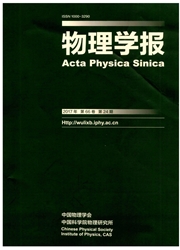

 中文摘要:
中文摘要:
本文研究了(001)Ga As量子阱薄膜中重空穴激子近共振抽运-探测的载流子自旋弛豫动力学,发现载流子的自旋极化对传统的线偏振光吸收饱和效应和载流子复合动力学都有影响.进一步的抽运流依赖的自旋弛豫和复合动力学研究表明,自旋极化对线偏振光的吸收饱和效应的影响随抽运流降低而变弱.在低激发流时,自旋极化对线偏振吸收饱和效应的影响才可忽略.然而,又显现出自旋极化对复合动力学的影响.分析表明复合动力学的自旋极化依赖性起源于重空穴激子形成浓度的自旋极化依赖性.复合动力学的自旋极化依赖性表明自旋弛豫时间计算中所涉及的复合时间应该使用自旋极化载流子的复合时间.基于二维质量作用定律的激子浓度计算表明,库仑屏蔽效应对激子形成的影响在较低激发载流子浓度下可以忽略.
 英文摘要:
英文摘要:
In this paper, the ultrafast dynamics of spin relaxation and recombination of photoexcited carriers has been studied in(001) Ga As quantum wells using a time-resolved pump-probe absorption spectroscopy under a nearly resonant excitation of heavy-hole excitons. It is found that the spin polarization of carriers influences both absorption saturation of linear polarized light and recombination dynamics of carriers. Pump fluence dependence of the ultrafast dynamics of spin relaxation and recombination of carriers is further studied, which shows that the effect of spin polarization on linearly polarized absorption saturation is reduced with lowering pump fluence. Spin-polarization-dependent absorption saturation effect can be ignored only as the pump fluence is weak. However, spin-polarization dependence of recombination dynamics is presented in turn at low pump fluence. Our analysis shows that such dependence originates from the spinpolarization dependence of the density of excitons formed in the excited carriers because recombination time constants of excitons and free carriers are very different so that the ratio of exciton density to free carrier density can influence the recombination dynamics. The spin-polarization dependence of ultrafast recombination dynamics of photoexcited carriers implies that the recombination time constant in the calculation of spin relaxation time from spin relaxation dynamics should be the recombination time of spin-polarized carriers, rather than the recombination lifetime of non-spin-polarized carriers as done currently. Exciton density is estimated based on 2D mass action law, which agrees very well with our experimental results. The good agreement between theoretical calculation and experimental results reveals that the effect of Coulomb screening on the formation of excitons may be ignored for a lower excited carrier density.
 同期刊论文项目
同期刊论文项目
 同项目期刊论文
同项目期刊论文
 期刊信息
期刊信息
